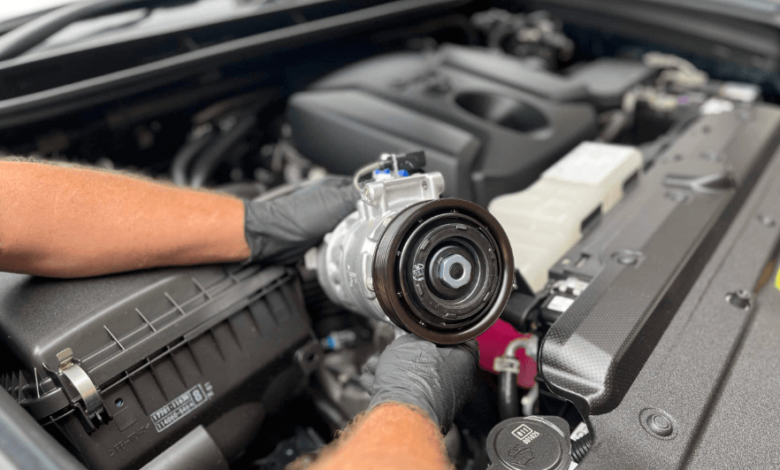The Importance of the Kia Air Conditioner Compressor in Your Car’s Cooling System

When you step into your Kia on a hot summer day, the cool breeze from the air conditioning system is often a relief. But have you ever wondered what makes that refreshing air possible? At the heart of every air conditioning system is the AC compressor, a crucial component that plays a central role in keeping your vehicle comfortable, especially during warm weather.
In this article, we’ll dive into the importance of the Kia air conditioner compressor, explaining its function within the overall vehicle cooling system. Understanding how the compressor works and how it contributes to the efficiency of your Kia’s air conditioning system can help you better care for your vehicle and address any issues that may arise over time.
What is the Kia Air Conditioner Compressor?
The Kia air conditioner compressor is a vital component in your car’s cooling system, responsible for keeping the air inside your vehicle cool and comfortable. The compressor is essentially the engine of the air conditioning system. It compresses and circulates refrigerant, a gas that absorbs heat from the air, allowing your air conditioning system to deliver cool air through the vents.
In simple terms, the compressor is what starts the process that cools down the air inside your car. Without it, the rest of the air conditioning system wouldn’t function. The AC compressor converts the refrigerant from a low-pressure gas to a high-pressure gas, and this change is critical for the rest of the cooling cycle.
See also: What Are the Implications of Deepfake Technology on Information Authenticity and Media Trust?
The Function of the Kia AC Compressor in the Cooling System
To understand the importance of the Kia AC compressor, it’s helpful to know how it fits into the broader Kia cooling system. The air conditioning system works in a continuous loop, where refrigerant is pressurized, cooled, and expanded to absorb heat from the cabin air. Here’s how the AC compressor plays a part in this cycle:
- Compression of Refrigerant: When you turn on the air conditioning in your Kia, the compressor begins its work. The compressor is powered by a drive belt connected to the engine, or in some models, it may be powered by an electric motor. As the refrigerant gas enters the compressor, it is compressed. This compression increases the pressure and temperature of the refrigerant, making it much hotter and highly pressurized.
- Pushing Refrigerant into the Condenser: Once the refrigerant is compressed, it’s pushed through the system to the condenser, located in front of the radiator. The condenser works like a heat exchanger, releasing the heat from the refrigerant and turning it back into a liquid state. This process cools down the high-temperature refrigerant, which is critical for continuing the cooling cycle.
- Expansion and Cooling: The now-liquid refrigerant flows into the expansion valve, where the pressure drops, and the refrigerant cools even further. This chilled liquid refrigerant then enters the evaporator inside the car’s cabin, where it absorbs heat from the air inside the car. As the refrigerant evaporates, it cools the air that’s blown through the vents. The refrigerant, now in a low-pressure gas form, returns to the compressor to start the cycle over again.
Throughout this cycle, the Kia AC compressor is essential in ensuring that the refrigerant moves through the system, maintaining the process that cools the air inside your car. Without a functioning compressor, none of this would be possible, and your air conditioning would fail to work effectively.
Why the Kia AC Compressor is So Important
The importance of the AC compressor cannot be overstated. Here are a few key reasons why the compressor is crucial to your Kia’s cooling system:
- Initial Step in the Cooling Cycle: The compressor is the starting point of the entire air conditioning process. If the compressor doesn’t function properly, the system can’t circulate refrigerant, which means that no cooling will occur. Whether you’re driving through the city or embarking on a road trip, the Kia air conditioner compressor ensures that the air conditioning system works efficiently.
- Efficient Cooling: By compressing the refrigerant, the compressor raises its temperature and pressure, making it possible for the refrigerant to move through the system and absorb heat. The high-pressure refrigerant can then be cooled and expanded, allowing it to absorb heat from the air inside the cabin and replace it with cooler air. In short, the compressor ensures that your air conditioning system cools the cabin effectively, maintaining a comfortable environment.
- Energy Efficiency: A well-functioning Kia air conditioner compressor contributes to the overall energy efficiency of your vehicle’s cooling system. If the compressor is working properly, it helps the entire air conditioning system run smoothly and minimizes the strain on the engine. This can improve fuel efficiency and reduce the wear and tear on other components in the air conditioning system.
- Prevention of Overheating: The compressor also plays a role in preventing the air conditioning system from overheating. By regulating the flow of refrigerant and ensuring it is cooled down at the right stages of the cycle, the compressor helps maintain the temperature balance inside the air conditioning system. This reduces the risk of overheating and component damage, especially in warmer climates where the AC is used frequently.
- Comfort and Safety: Ultimately, the Kia AC compressor ensures your vehicle stays comfortable, especially in hot weather. A well-functioning AC compressor helps maintain a comfortable temperature inside the cabin, which is crucial for driver and passenger comfort, as well as safety. Excessive heat in the cabin can lead to driver fatigue, distraction, and even dehydration. Keeping your vehicle’s air conditioning system in top shape, including the compressor, is essential for a safe and pleasant driving experience.
Common Problems with the Kia AC Compressor
Though the Kia AC compressor is designed to last for many years, it is not immune to issues. Over time, wear and tear can lead to problems that affect the overall function of the air conditioning system. Some common issues with AC compressors include:
- Clutch Failure: The clutch engages and disengages the compressor, and a failure in this component can prevent the compressor from activating properly.
- Leaks: Over time, seals and hoses connected to the compressor may wear out, causing refrigerant leaks. This can lead to a loss of cooling performance.
- Electrical Failures: Electrical components that control the compressor may malfunction, causing the system to fail to cool the cabin air.
- Compressor Seizure: If the compressor becomes clogged with debris or experiences internal damage, it can seize up, preventing the air conditioning system from working altogether.
Conclusion
The Kia air conditioner compressor is an indispensable part of your vehicle’s air conditioning system. It plays a key role in compressing and circulating refrigerant, ensuring that your car’s cabin stays cool and comfortable during the warmer months. Understanding the importance of the AC compressor helps you recognize how essential this component is to the overall efficiency of your vehicle’s cooling system. Regular maintenance, prompt repairs, and keeping an eye on any signs of malfunction can help extend the life of your compressor and keep your Kia’s air conditioning system running smoothly for years to come.







